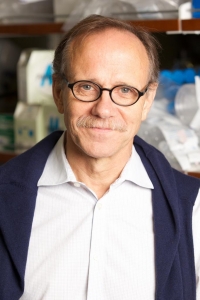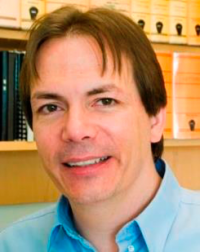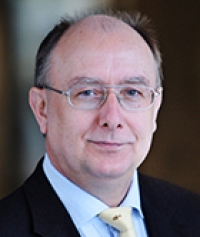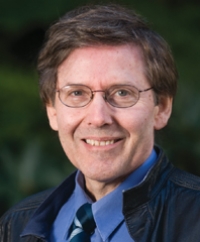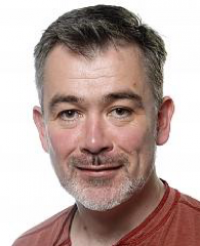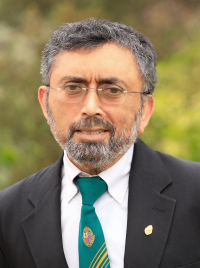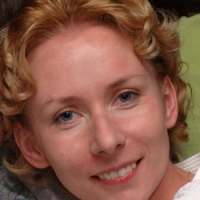Cellular and Molecular Explorations of Anthropogeny
Biographical Sketches: Co-Chairs
Salk Institute for Biological Studies
Fred H. Gage is a Professor in the Laboratory of Genetics and the past President (2018-2023) of the Salk Institute. He is an Adjunct Professor at UC San Diego, and emeritus Co-Director of CARTA. Dr. Gage concentrates on the adult central nervous system and unexpected plasticity and adaptability to environmental stimulation that remains throughout the life of all mammals. His work may lead to methods of replacing or enhancing brain and spinal cord tissues lost or damaged due to Neurodegenerative disease or trauma. Gage's lab showed that, contrary to accepted dogma, human beings are capable of growing new nerve cells throughout life. Small populations of immature nerve cells are found in the adult mammalian brain, a process called Neurogenesis. He is working to understand how these cells can be induced to become mature functioning nerve cells in the adult brain and spinal cord. They showed that environmental enrichment and physical exercise can enhance the growth of new brain cells and they are studying the underlying cellular and molecular mechanisms that may be harnessed to repair the aged and damaged brain and spinal cord. Gage is a member of the National Academy of Science and the Institute of Medicine.
Biographical Sketches: Speakers
University of Washington School of Medicine
Evan Eichler, PhD, is a Professor and Howard Hughes Medical Institute Investigator in the Department of Genome Sciences, University of Washington School of Medicine, and serves on the CARTA External Advisory Board. He graduated with a B.Sc. Honours degree in Biology from the University of Saskatchewan, Canada, in 1990. He received his PhD in 1995 from the Department of Molecular and Human Genetics at Baylor College of Medicine, Houston, Texas. After a Hollaender postdoctoral fellowship at Lawrence Livermore National Laboratory, he joined the faculty of Case Western Reserve University in 1997 and later the University of Washington in 2004. He was a March of Dimes Basil O’Connor Scholar (1998–2001), appointed as an HHMI Investigator (2005), awarded an AAAS Fellowship (2006) and the American Society of Human Genetics Curt Stern Award (2008), and elected to the National Academy of Sciences (2012) and the National Academy of Medicine (2017). He is an editor of Genome Research and has served on various scientific advisory boards for both the NIH and NSF. His research group provided the first genome-wide view of segmental duplications within human and other primate genomes and he is a leader in an effort to identify and sequence normal and disease-causing structural variation in the human genome. The long-term goal of his research is to understand the evolution and mechanisms of recent gene duplication and its relationship to copy number variation and human disease with a specific emphasis on the genetic architecture of autism and neurodevelopmental delay.
Max Planck Institute of Molecular Cell Biology and Genetics
Wieland Huttner studied medicine in Hamburg and Oxford and obtained his MD from Hamburg University in 1976. His CV thereafter – post-doctorate at the Max Planck Institute for Experimental Medicine and at Yale University, head of a junior research group at the Max Planck Institute of Psychiatry in Munich, German Habilitation in physiological chemistry at Würzburg University (1985), group head at the European Molecular Biology Laboratory Heidelberg, full professor and head of the Institute for Neurobiology Heidelberg University (1991).
He is one of the Founding Directors of the Max Planck Institute of Molecular Cell Biology and Genetics in Dresden (since 1998) and currently the Managing Director, a Honorary Professor for Neurobiology at the Technische Universität Dresden, and has been the Chair of the Scientific Council of the Max Planck Society from 2009 to 2012.
UC San Francisco Medical School
Dr. Kriegstein received a BS from Yale University (1971), and MD and PhD from New York University (1977). He completed Neurology Residency at the Brigham and Women’s, Children’s, and Beth Israel Hospitals, Boston, and is a board-certified clinical neurologist. He has held academic appointments at Stanford, Yale, and Columbia before joining UCSF in 2004. In 2001 he was named the John and Elizabeth Harris Professor of Neurology and became the founding Director of the Neural Stem Cell Program at Columbia University. Dr. Kriegstein is currently the John Bowes Distinguished Professor in Stem Cell and Tissue Biology and Founding Director of the Eli and Edythe Broad Center of Regeneration Medicine and Stem Cell Research at UCSF. He was elected a member of the National Academy of Medicine in 2008. Dr. Kriegstein’s research focuses on the stem cell niche and ways neural stem and progenitor cells produce neurons in the developing brain. He is particularly interested in human cortical development, brain evolution, and neurodevelopmental disease.
Gurdon Institute, University of Cambridge
Rick Livesey is a Senior Group Leader, a Wellcome Trust Senior Investigator, and founding director of the Alzheimer’s Research UK Stem Cell Research Centre at the Gurdon Institute, University of Cambridge, where he is also a fellow of Trinity College. Prior to joining the faculty at the University of Cambridge in 2001, Livesey was a Howard Hughes Medical Institute Research Fellow in the Department of Genetics at Harvard Medical School. He graduated from the University of Cambridge M.D./Ph.D. program in 1997, carrying out his Ph.D. at the Medical Research Council (MRC) Laboratory of Molecular Biology.
Columbia University
Dr. Franck Polleux did his undergraduate and graduate studies at Université Claude Bernard in Lyon, (France) where he obtained his Ph.D. in Neuroscience in 1997. He then joined the laboratory of Dr. Anirvan Ghosh at Johns Hopkins University for his post-doctoral training. He is now a Professor in the Department of Neuroscience and the new Zuckerman Mind, Brain, Behavior Institute at Columbia University. Throughout his career, Dr Polleux has identified some key cellular and molecular mechanisms underlying the development, evolution and maintenance of neuronal connectivity. He received several awards including the 2005 Pew Scholar Award in Biomedical Sciences, the NARSAD Young Investigator Award and the 2015 Award from the Roger De Spoelberch foundation.
UC San Diego School of Medicine
Ajit Varki is a Distinguished Professor of Medicine and Cellular & Molecular Medicine, Emeritus Co-Director of CARTA, Emeritus Co-Director of the Glycobiology Research and Training Center at UC San Diego, and Adjunct Professor at the Salk Institute. He received basic training in physiology, medicine, biology, and biochemistry at the Christian Medical College (CMC), Vellore, The University of Nebraska, and Washington University in St. Louis. He also has formal training and board certification in internal medicine, hematology, and oncology. Varki is the executive editor of Essentials of Glycobiology (Cold Spring Harbor Press, 4th Edition, 2022) and is recipient of a MERIT award from the NIH, and an American Cancer Society Faculty Research Award. Honorific elections include the American Academy of Arts and Sciences, the National Academy of Medicine, the American Society for Clinical Investigation, and the Association of American Physicians. He is also recipient of the three highest honors in his field, the Karl Meyer Award of the Society for Glycobiology, the International Glycoconjugate Organization Award and the Rosalind Kornfeld Award for Lifetime Achievement in Glycobiology. He is recognized for creating the first major open access research journal (J. Clin. Invest., 1996) as well as the first major open access textbook (Essentials of Glycobiology, 2009). He was honored with the Old Cottonian of Eminence Award at the 150th Anniversary of Bishop Cotton Boys School, Bangalore, India, (2015) as well as a Distinguished Faculty Medal and Oration at his medical school alma mater, CMC, Vellore. Significant past appointments include: Co-Head, UC San Diego Division of Hematology-Oncology; President of the Society for Glycobiology; Editor-in-Chief of the Journal of Clinical Investigation; Interim Director of the UC San Diego Cancer Center, President of the American Society for Clinical Investigation, and UC San Diego Associate Dean for Physician-Scientist Training. Varki's research interests are focused on a family of cell surface sugars called sialic acids, and their roles in biology, evolution and disease. Currently, active projects are relevant to the roles of sialic acids in microbial infectivity, the regulation of the immune response, the progression and spread of tumors, aging, and unique aspects of human evolution. His group is particularly intrigued to find multiple interrelated differences in sialic acid biology between humans and our closest evolutionary cousins, the "great apes." These differences are a signature of the events that occurred during the last few million years of human evolution, and appear to be relevant to understanding several aspects of the current human condition, both in health and disease. Varki’s book, Denial (Twelve, Hachette Books, 2013), explores a novel "Mind Over Reality Transition” (MORT) theory that denying reality and personal mortality was a key step in allowing the emergence of a full theory of mind, and in the origin of our species.
Stanford University
Joanna Wysocka, Ph.D., is a Professor in the Department of Chemical and Systems Biology and the Department of Developmental Biology at Stanford University and a Howard Hughes Medical Insitute Investigator. Joanna was born and grew up in Poland, and she moved to the US for her PhD work at the Cold Spring Harbor Laboratory with Dr. Winship Herr. After graduating in 2003, she has done postdoctoral training at the Rockefeller University with Dr. David Allis. Research Dr. Wysocka’s laboratory is focused on understanding how the genetic instructions encoded by cis-regulatory elements are interpreted in the context of a cellular state and signaling milieu to establish chromatin states either permissive or restrictive for gene expression during embryogenesis. She has a particular interest in the molecular basis underlying cellular plasticity, commitment and differentiation, as well as human development and evolution. Dr. Wysocka is a recipient of numerous awards, including the Searle Scholar Award, W.M. Keck Foundation Distinguished Young Scholar Award, 2010 International Society for Stem Cell Research Outstanding Young Investigator Award, and 2013 Vilcek Prize for Creative Promise.
